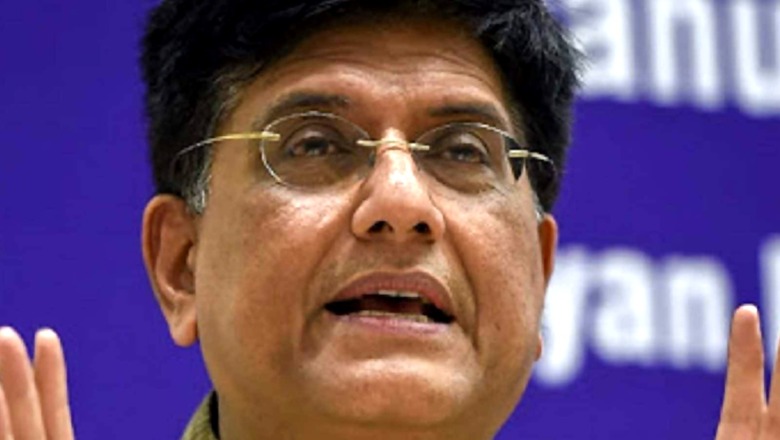
views
The Union Cabinet that was headed by Prime Minister Narendra Modi, on Wednesday approved the production linked incentive (PLI) scheme for the textile sector. The PLI Scheme for Textiles for MMF Apparel, MMF Fabrics and 10 segments/ products of Technical Textiles with a budgetary outlay of Rs. 10,683 crore was given the green light. The scheme will result in a fresh investment of above Rs 19,000 crore. It will also benefit an additional production turnover of over Rs 3 lakh crore in the next five years. This will have a significant positive impact on States like Gujarat, Uttar Pradesh, Maharashtra, Tamil Nadu, Punjab, Andhra Pradesh, Telangana, Odisha etc. It was also conveyed that the scheme would have higher investment priority towards Aspirational Districts as well as Tier 3 and Tier 4 cities and towns.
The Union Cabinet had earlier approved PLI schemes in 13 key sectors for enhancing India’s manufacturing capabilities and exports. After the approval, the textiles ministry would come with detailed guidelines of the scheme for these sectors. The announcement of the PLI scheme for the textiles sector was part of the initial 13 sectors for which the PLI schemes were announced during the Unione Budget 2021-22, with a minimum outlay of 1.97 lakh crore. With the announcement of PLI Schemes for 13 sectors, minimum production in India is expected to be around Rs. 37.5 lakh crore over 5 years and minimum expected employment over 5 years is nearly 1 crore.
The main objective or aim of the scheme was to make manufacturing in India a globally competitive phenomenon. It aimed to do so by removing sectoral disabilities, creating economies of scale and ensuring efficiencies. It was made to create a complete component ecosystem in India and bring Indian firms into the global spotlight and make them a part of the global supply chains. The scheme is also expected to create an employment generation of around 7.5 lakh jobs. It would also help pave the way for more participation of women in larger numbers.
The scheme is expected to attract global investments, generate large scale employment opportunities as mentioned before and even enhance exports substantially. India’s export of man-made fibre (MMF) garments constitutes only 10 per cent of its total apparel exports, which was about $16 billion in 2019-20.
Textile Minister Piyush Goyal had expressed that with every incremental investment in the textile sector, more employment was created. He said that traditionally we have invested in cotton, however, he said that today 2/3rd of the global market consists of man-made and technical textiles. He states that the PLI scheme was approved in order to facilitate India’s contribution to this ecosystem.
Goyal said that several other initiatives such as raw material availability at the right price have been taken up by the government. He added that the policy initiatives taken in the wake of the Modi government have been unprecedented. It was told that there were two broad categories that were identified for the PLI scheme in textiles and these were investments up to Rs 100 crore and investments up to Rs 300 crore.
Additionally, Goyal had stated that India is now the second-largest maker of PPE, citing examples such as textiles used in the defence and health sectors. He said that the government is committed to the textile sector and is holding continued deliberations with stakeholders.
India is currently working on Free Trade Agreements (FTAs) with Western countries like the United Kingdom, European Union and the United Arab Emirates. Speaking on this, Goyal said, “We are planning to correct the tariff restrictions on Indian products. We are trying to cover this disability in the FTAs. FTAs can’t be done in hurry. FTAs done in a hurried manner in the past have hurt the Indian interests. That is the reason India opted out of RCEP. Our principle for FTA is reciprocity.”
Speaking on the PLI scheme announcement, Saurabh Kanchan, Partner at Deloitte India said, “In line with Government’s vision to make India a global textile leader and reduce import dependencies, Production Linked Incentive (‘PLI’) scheme for man-made fibre and technical textiles has been approved by the Union Cabinet today. This scheme complements similar efforts such as the proposal to establish Mega Investment Textiles Parks (MITRA), foreign trade policy schemes such as RoSCTL, RoDTEP and existing State incentive policies aimed towards enabling the textile industry to become globally competitive, attract large investments, boost employment generation and exports.
“The consistent measures taken by the Government of India indicate the clear aim of making India a global champion in the man-made fibre and technical textile sector. It would now be interesting to watch out for industry participation in view of the investment thresholds for a labour-intensive sector. Also, the details around the product coverage, percentage of incentive, sales group targets and other related aspects awaited,” added Kanchan.
Read all the Latest News, Breaking News and Assembly Elections Live Updates here.


















Comments
0 comment